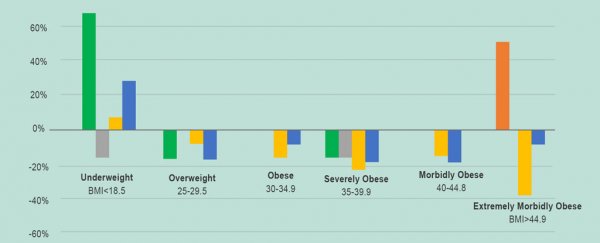Update 2 (17 November 2015): Please see our updates below in relation to subsequently disclosed conflicts of interest for this research.
What do you think makes obese people obese? Are you imagining fried food, gallons of Coke and bowls full of sugar-filled candy? These are the demonised foodstuffs we're often told are primarily responsible for developed nations' obesity crises, but according to a new study, they're not the real culprit for America's weight problem.
Researchers at Cornell University examined 2007–2008 data to examine the links were between the consumption of soda, candy and fast food and obesity in the US. What they found may come as a bit of a surprise. According to the research, for 95 percent of adult Americans there's no link between their consumption of junk food and their body mass index (BMI). Wait… what?
"Simply put, just because those things can lead you to get fat doesn't mean that's what is making us fat," said David Just, co-director of the Cornell University Food and Brand Lab, as reported by Matt Hayes at the Cornell Chronicle. "By targeting just these vilified foods, we are creating policies that are not just highly ineffective, but may be self-defeating as it distracts from the real underlying causes of obesity."
According to the findings, it's only those at the very extremes of the weight spectrum – the chronically underweight and the morbidly obese – whose consumption of junk food is tied to their BMI. For 19 out of 20 people in the US, the amount of junk food consumed invariably varies, but it doesn't seem to be tied to their body size.
In other words, the causes of obesity are more complex than our propensity to indulge in nutritionally bereft fast food, soft drink and sweets – no matter how good they taste sometimes.
So if soda pop, chocolate bars and greasy hamburgers aren't what's making us fat – none of which the researchers say we should eat, by the way (sorry, guys, there's no such greenlight here!) – then what is?
Well, the answer isn't in this research, but finding the answer will lie in examining people's overall levels of sedentary behaviour, their exercise habits and assessing their inadequate intake of healthy foods, chiefly fruits and vegetables, but also healthy proteins, carbohydrates and other food groups.
"If you want to try and prevent obesity, or want to create policy that is going to help people, simply addressing the availability of junk foods and sodas isn't going to do it," said Just. "This isn't the difference between fat people and skinny people. It's other things."
The researchers have published the following infographic to accompany their study, which helps clarify some of the finding's key points (and a high-res version is available here). The study itself is published in Obesity Science & Practice.
Update 1: We've received a lot of enquiries from concerned readers as to whether this research was funded by Coca-Cola, which would raise an understandable red flag in many people's eyes, especially given the authors' findings. However, to the best of our knowledge, there's no such funding from Coca-Cola for this study, nor any outside or corporate funding involved.
The study is from researchers at Cornell University, and if you follow this link to see the pre-peer-reviewed version of the paper, you can see that the first page clearly states "There were no outside sources of funding" and "There are no conflicts of interest to disclose".
Update 2 (17 November 2015): In response to further reader feedback on this particular study, we've gone back and rechecked the pre-peer-reviewed version of the paper linked to above, which has subsequently been revised after we wrote our original story. The edited paper now states a conflict of interest, which is that one of the authors "is a member of McDonald's Global Advisory Council, and he is on the Executive Board for the EAT Initiative for Sustainability", which was not information we were made aware of when originally researching this article.
 Credit: Cornell University Food and Brand Lab
Credit: Cornell University Food and Brand Lab
